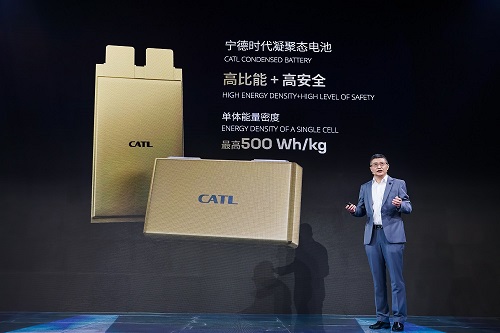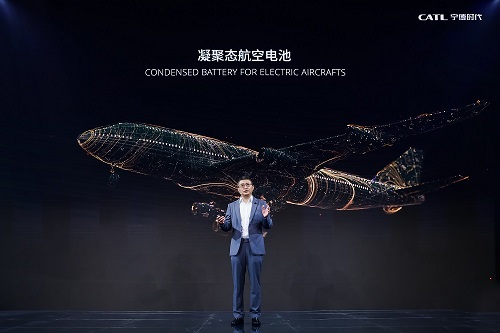At this week’s Auto Shanghai, CATL announced a new battery technology that it says offers sufficient energy density to enable the electrification of passenger aircraft.
CATL says its new condensed battery will offer specific energy (energy stored per unit of weight) of up to 500 Wh/kg, as well as “a high level of safety,” and that it “can achieve mass production of condensed battery in a short period of time.”
“CATL’s condensed battery leverages highly conductive biomimetic condensed-state electrolytes to construct a micron-level self-adaptive net structure that can adjust the interactive forces among the chains, thus improving the conductive performance of the cells and in turn the efficiency of lithium-ion transport while boosting stability of the microstructure,” says the company.


Condensed battery also “integrates a range of innovative technologies, including ultra-high energy density cathode materials, innovative anode materials, separators, and manufacturing processes, offering excellent charge and discharge performance as well as good safety performance.”
A specific energy of 500 Wh/kg would be a giant leap forward—for comparison, Tesla’s 4680 cell, considered one of the best on the market, delivers an estimated 272-296 Wh/kg. Such performance could enable a number of applications currently considered difficult or impractical for lithium-ion batteries, including aviation.
The pedantic pundit feels compelled to clarify that, whereas CATL follows the common practice of using the term energy density to refer to energy per unit of weight, the correct technical term for this is specific energy. (Density is defined in terms of volume, so energy density properly refers to energy per unit of volume.) In practice, the two specifications are closely related—a cell with high energy density is going to have high specific energy, and vice versa.


Both attributes are of supreme importance to aircraft designers, as both weight and space are major constraints in aviation.
CATL says it is “cooperating with partners in the development of electric passenger aircraft, and practicing aviation-level standards and testing in accordance with aviation-grade safety and quality requirements.” The company also expects to put an automotive-grade version of condensed batteries into mass production this year.
Source: CATL

















































